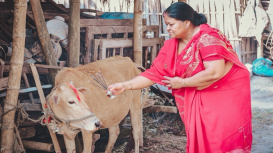Diwali, also known as the festival of lights, is one of the most widely celebrated festivals of the Indian subcontinent. Diwali, as celebrated in various parts of the country today, has regional variations and is often adapted to the traditions of the respective communities. For instance, Brahmanical Diwali celebration offers homage mainly to Goddess Lakshmi; however, in Jaina Diwali, though worship of wealth has an important place, its celebration originated in relation to Mahavira’s entering nirvana (enlightenment).
The celebration of Diwali in India goes back centuries. It finds mention in some of the oldest religious texts such as the Puranas. The texts differ on the dates on which Diwali is to be celebrated and mention different rituals in different cultural contexts; though many of the old practices are no longer followed, some have survived the test of time.
